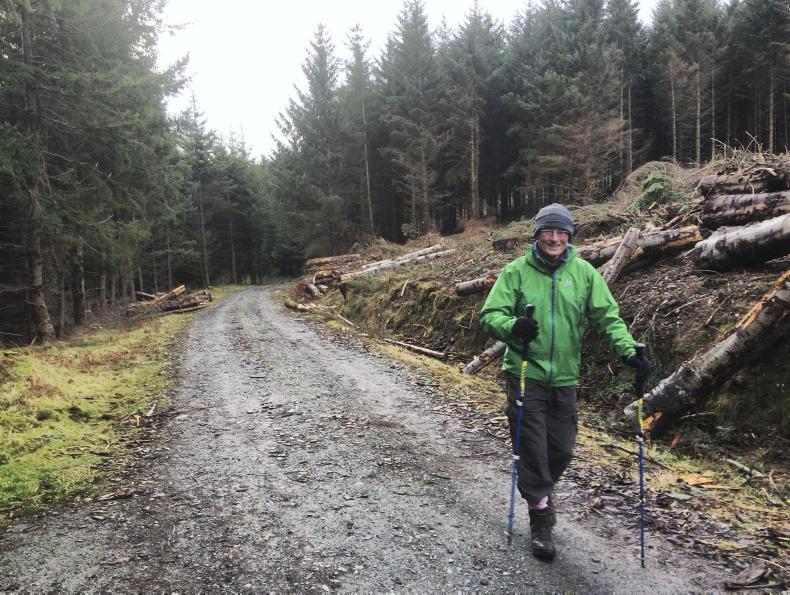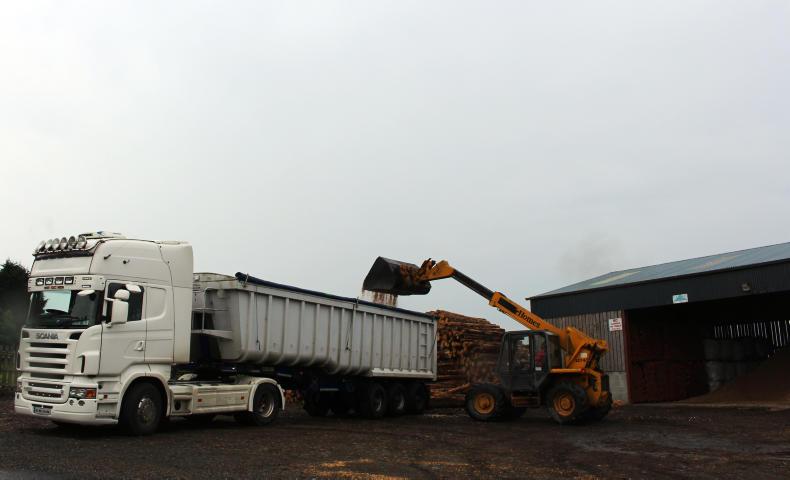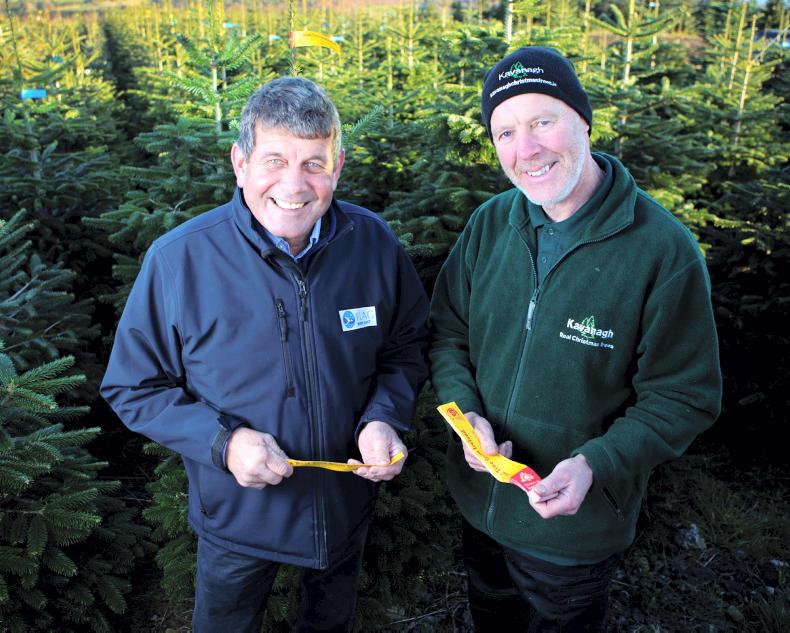One of the submissions made to the Department of the Taoiseach last September, on developing Ireland’s bioeconomy, positioned “forestry as a central pillar of Ireland’s national policy on the bioeconomy”.
The bioeconomy is particularly relevant to Ireland as it comprises the section of the economy which focuses on Ireland’s rich abundance of land and sea natural renewable resources. These include agriculture, food, fisheries, marine and forestry or producers of food, feed, fibre, bio-based products and bioenergy.
The ambitious submission made on behalf of the forestry and forest products sector by a Department of Agriculture working group, was based on Ireland’s commitment to a decarbonisation approach in the land-use sector without compromising food production. However, it did not spell out the organisation or agency that would act as a driver in maximising the role of forestry in the bioeconomy. With the exception of forestry, all other natural resource sectors have had state agencies in place for decades to maximise their roles in developing a national bioeconomy strategy for Ireland. These include food (Bord Bia), fisheries (BIM), inland fisheries (IFI), ports and shipping (IMDO), marine research (Marine Institute), renewable energy (SEI) and earth science (GSI).
Michael Guilfoyle, who played a key role in setting up a number of these organisations, identified the need for an independent Forestry Development Agency (FDA) in 2007 when he was assistant secretary general in the Department of Communications. After his retirement, he supported the establishment of the agency and welcomed the Department’s recommendation in 2014 to set up a taskforce to consider the establishment of “a stand-alone body or agency”. In this interview, he reiterates his views on why an FDA is overdue to develop and promote the forestry and forest products sector.
DM: You were involved in the establishment of State bodies similar to the FDA. Could you provide some background on these and their relevance to forestry?
MG: During my time as assistant secretary general, I was responsible to the minister for the development and implementation of Government policy in the areas of inland fisheries, sea fisheries, marine research, ports and shipping, as well as forestry and other central departmental functions. With the exception of forestry, the promotion and development of these sectors, within overall Government policy, were statutorily delegated to proactive, highly professional bodies whose sole role was the furtherance of the contribution by these sectors, in consultation with a range of interest groups, to national wellbeing.
DM: Isn’t the sector well catered for at the moment by the Forest Service and support organisations?
All of these bodies have developed a high level of professionalism in their perceived areas, but in my experience their contribution tends to be diffuse, uncoordinated and somewhat detached from what is needed, unlike the statutory bodies I mentioned previously. These are required to be single-minded and exclusive in their focus on, and ownership of, the promotion and development of their own sectors and particularly the maintenance of viable policy instruments and actions. These include the early identification of threats to policy implementation and the delivery of robust responses where policy is challenged within or without the system. I’m just not sure that the existing bodies, either singly or collectively, do that.
Wouldn’t an FDA be in competition with the Forest Service?
Regarding competition, the exact opposite is true. FDA would be “under” and subject to the corporate governance of the Forest Service. The FDA services and knowledge base would be available to the Department and the minister on an ongoing basis. Its value would be as the professional body in constant touch with the sector, international developments, its interest groups and with the policy challenges and threats to the sector. Also, it would be the generator, gatherer and developer of innovative approaches and other “good ideas” for the Forest Service from its own research and ideas fed to it by the sector. All of this would be invaluable to maintaining a “freshness” to policy, especially implementation.
Where is the forestry sector falling down in performance and how would the agency improve matters?
Forestry policy has been subject to unanticipated lurches in the past, which have introduced uncertainties badly affecting confidence and investment. Also, I feel that the forestry sector has been “fair game” for objectors and people who are sceptical about its value as a land use option and for other State agencies in say the environmental and even the inland fisheries areas. The fall-off in afforestation and the non-delivery of targets might have been “headed off”, as it were, if there had been an alert, proactive, internally positioned body with the early warning antennae to identify and muster the material to counter these objections.
What do you see as the immediate challenges facing the establishment of this agency?
The immediate challenges are first, agreeing an agency in principle; second, agreeing on its exact functions and relationships; third agreeing a staff complement; and, fourth – and most importantly – getting a good dynamic person to head it up.
So how should it proceed?
The minister and the Department should design a short consultancy steered at secretary or assistant secretary general level and having two or three members on the consultancy steering group. The terms of reference of the consultancy would review the case for an agency and, if agreed, outline in detail the role, functions and relationships of the agency. I believe a first step such as this is essential if some of the uncertainty around the need for, and nature of, the FDA is to be dispelled.
Could you outline how the FDA would function structurally and its relationship with the Department?
It would have a CEO and small staff with a council representing relevant stakeholders. The council would function as its governing board and would guide the growth of the body within its statutory mandate and oversee recruitment of its CEO. Its relationship to the Department would be via the Forest Service/Department, which would be responsible for its corporate governance, performance delivery and funding. There are plenty of models for this within the public sector.
So the FDA would have a statutory basis?
Yes, ideally along the lines of the IMDO whose terms of reference and duties are set out in fisheries legislation. In other words, it would concentrate the minds of its CEO and council of their responsibilities and accountabilities regarding delivery of objectives and the spending of money if it was enshrined in primary legislation. Also, a firm statutory basis conveys permanence and continuity.
What do you think the response will be to the agency?
I believe it will be positive, based on my experience of setting up other organisations in natural resources.
We asked a cross section of stakeholders from nurseries to wood processing for their views on the need for an independent FDA.
‘‘This agency would act as a link between all stages of the industry and adopt a “seed-to-sawmill” approach to forestry. As well as its developmental role, the forest industry needs a champion to counteract the negativity that is currently allowed unchallenged.’’– John Kavanagh, nursery manager, None so Hardy Nurseries
‘‘Unlike other sectors such as agriculture and fisheries, forestry doesn’t have an agency or independent structure to represent the industry in its totality. This agency would address forestry as an industry unlike current structures which are ill equipped to address the commercial performance of the sector including afforestation, wood mobilisation and proper forestry planning for the processing sector to ensure continuity of future timber supply.’’– John Murray, Murray Timber Group and chair, Irish Timber Council
‘‘Forestry is Ireland’s most sustainable indigenous rural industry, yet is the only sector with no dedicated development agency. A strong, coherent approach is required to expand the resource to yield further societal, industry and environmental benefits. In this regard, the FDA is an absolute must and the need is now, not in the future.’’– Paddy Bruton, CEO,
Forestry Services
‘‘The agency would play a central role in supporting the sector to address challenges such as mobilising over three million cubic metres annually by the end of the next decade, mainly in farm forests. It could also focus on developing the forest bioeconomy, to foster new local and regional value added timber markets, which would increase the return to farmers and positively affect the afforestation programme.’’– Geraldine O’Sullivan,
IFA farm forestry executive
‘‘Foresters and other stakeholders who shape the forestry and forest products sector need the right environment to maximise the forest resource. The sector has outgrown existing structures and needs an independent agency which would address a number of key issues including the diminishing role of research in Irish forestry, wood mobilisation and an underperforming afforestation programme.’’– Gerry Murphy, president,
Society of Irish Foresters
Michael Guilfoyle, former assistant secretary general in the Department of Communications, Marine and Natural Resources, played a key role in establishing statutory bodies such as the Irish Marine Development Office and the Marine Institute. Since retiring, he has undertaken consultancies for the OECD and the EU. He is a regular contributor to the popular Irish Times “Walk for the Weekend” series. He holds an MSc (Econ) in policy studies from Trinity College.
Minister Doyle presents certificates
to forest harvester operators
Minister of State with responsibility for forestry Andrew Doyle, recently presented Quality and Qualifications Ireland (QQI) certificates to the first two students who have completed the new forest harvesting training course at the Teagasc Agriculture College, Ballyhaise. Congratulating the two students – Martin McManus and Brendan Lynch – Minister Doyle said the training course is an “excellent collaboration between all players in the forestry sector including my Department, industry representatives, state bodies and educators”.
Harvester training is now close to the Scandinavian model which includes a year’s induction in all aspects of harvesting. “QQI-certified forest machine operator courses have been developed by the Forestry Harvesting Training Forum (FHTF) with support from the Forest Service,” said Marianne Lyons, course lecturer.
Best practice
“These programmes are based on best practice for forest forwarder and harvester operations and include learning support, manuals and reference material for machine operators.”
One of the submissions made to the Department of the Taoiseach last September, on developing Ireland’s bioeconomy, positioned “forestry as a central pillar of Ireland’s national policy on the bioeconomy”.
The bioeconomy is particularly relevant to Ireland as it comprises the section of the economy which focuses on Ireland’s rich abundance of land and sea natural renewable resources. These include agriculture, food, fisheries, marine and forestry or producers of food, feed, fibre, bio-based products and bioenergy.
The ambitious submission made on behalf of the forestry and forest products sector by a Department of Agriculture working group, was based on Ireland’s commitment to a decarbonisation approach in the land-use sector without compromising food production. However, it did not spell out the organisation or agency that would act as a driver in maximising the role of forestry in the bioeconomy. With the exception of forestry, all other natural resource sectors have had state agencies in place for decades to maximise their roles in developing a national bioeconomy strategy for Ireland. These include food (Bord Bia), fisheries (BIM), inland fisheries (IFI), ports and shipping (IMDO), marine research (Marine Institute), renewable energy (SEI) and earth science (GSI).
Michael Guilfoyle, who played a key role in setting up a number of these organisations, identified the need for an independent Forestry Development Agency (FDA) in 2007 when he was assistant secretary general in the Department of Communications. After his retirement, he supported the establishment of the agency and welcomed the Department’s recommendation in 2014 to set up a taskforce to consider the establishment of “a stand-alone body or agency”. In this interview, he reiterates his views on why an FDA is overdue to develop and promote the forestry and forest products sector.
DM: You were involved in the establishment of State bodies similar to the FDA. Could you provide some background on these and their relevance to forestry?
MG: During my time as assistant secretary general, I was responsible to the minister for the development and implementation of Government policy in the areas of inland fisheries, sea fisheries, marine research, ports and shipping, as well as forestry and other central departmental functions. With the exception of forestry, the promotion and development of these sectors, within overall Government policy, were statutorily delegated to proactive, highly professional bodies whose sole role was the furtherance of the contribution by these sectors, in consultation with a range of interest groups, to national wellbeing.
DM: Isn’t the sector well catered for at the moment by the Forest Service and support organisations?
All of these bodies have developed a high level of professionalism in their perceived areas, but in my experience their contribution tends to be diffuse, uncoordinated and somewhat detached from what is needed, unlike the statutory bodies I mentioned previously. These are required to be single-minded and exclusive in their focus on, and ownership of, the promotion and development of their own sectors and particularly the maintenance of viable policy instruments and actions. These include the early identification of threats to policy implementation and the delivery of robust responses where policy is challenged within or without the system. I’m just not sure that the existing bodies, either singly or collectively, do that.
Wouldn’t an FDA be in competition with the Forest Service?
Regarding competition, the exact opposite is true. FDA would be “under” and subject to the corporate governance of the Forest Service. The FDA services and knowledge base would be available to the Department and the minister on an ongoing basis. Its value would be as the professional body in constant touch with the sector, international developments, its interest groups and with the policy challenges and threats to the sector. Also, it would be the generator, gatherer and developer of innovative approaches and other “good ideas” for the Forest Service from its own research and ideas fed to it by the sector. All of this would be invaluable to maintaining a “freshness” to policy, especially implementation.
Where is the forestry sector falling down in performance and how would the agency improve matters?
Forestry policy has been subject to unanticipated lurches in the past, which have introduced uncertainties badly affecting confidence and investment. Also, I feel that the forestry sector has been “fair game” for objectors and people who are sceptical about its value as a land use option and for other State agencies in say the environmental and even the inland fisheries areas. The fall-off in afforestation and the non-delivery of targets might have been “headed off”, as it were, if there had been an alert, proactive, internally positioned body with the early warning antennae to identify and muster the material to counter these objections.
What do you see as the immediate challenges facing the establishment of this agency?
The immediate challenges are first, agreeing an agency in principle; second, agreeing on its exact functions and relationships; third agreeing a staff complement; and, fourth – and most importantly – getting a good dynamic person to head it up.
So how should it proceed?
The minister and the Department should design a short consultancy steered at secretary or assistant secretary general level and having two or three members on the consultancy steering group. The terms of reference of the consultancy would review the case for an agency and, if agreed, outline in detail the role, functions and relationships of the agency. I believe a first step such as this is essential if some of the uncertainty around the need for, and nature of, the FDA is to be dispelled.
Could you outline how the FDA would function structurally and its relationship with the Department?
It would have a CEO and small staff with a council representing relevant stakeholders. The council would function as its governing board and would guide the growth of the body within its statutory mandate and oversee recruitment of its CEO. Its relationship to the Department would be via the Forest Service/Department, which would be responsible for its corporate governance, performance delivery and funding. There are plenty of models for this within the public sector.
So the FDA would have a statutory basis?
Yes, ideally along the lines of the IMDO whose terms of reference and duties are set out in fisheries legislation. In other words, it would concentrate the minds of its CEO and council of their responsibilities and accountabilities regarding delivery of objectives and the spending of money if it was enshrined in primary legislation. Also, a firm statutory basis conveys permanence and continuity.
What do you think the response will be to the agency?
I believe it will be positive, based on my experience of setting up other organisations in natural resources.
We asked a cross section of stakeholders from nurseries to wood processing for their views on the need for an independent FDA.
‘‘This agency would act as a link between all stages of the industry and adopt a “seed-to-sawmill” approach to forestry. As well as its developmental role, the forest industry needs a champion to counteract the negativity that is currently allowed unchallenged.’’– John Kavanagh, nursery manager, None so Hardy Nurseries
‘‘Unlike other sectors such as agriculture and fisheries, forestry doesn’t have an agency or independent structure to represent the industry in its totality. This agency would address forestry as an industry unlike current structures which are ill equipped to address the commercial performance of the sector including afforestation, wood mobilisation and proper forestry planning for the processing sector to ensure continuity of future timber supply.’’– John Murray, Murray Timber Group and chair, Irish Timber Council
‘‘Forestry is Ireland’s most sustainable indigenous rural industry, yet is the only sector with no dedicated development agency. A strong, coherent approach is required to expand the resource to yield further societal, industry and environmental benefits. In this regard, the FDA is an absolute must and the need is now, not in the future.’’– Paddy Bruton, CEO,
Forestry Services
‘‘The agency would play a central role in supporting the sector to address challenges such as mobilising over three million cubic metres annually by the end of the next decade, mainly in farm forests. It could also focus on developing the forest bioeconomy, to foster new local and regional value added timber markets, which would increase the return to farmers and positively affect the afforestation programme.’’– Geraldine O’Sullivan,
IFA farm forestry executive
‘‘Foresters and other stakeholders who shape the forestry and forest products sector need the right environment to maximise the forest resource. The sector has outgrown existing structures and needs an independent agency which would address a number of key issues including the diminishing role of research in Irish forestry, wood mobilisation and an underperforming afforestation programme.’’– Gerry Murphy, president,
Society of Irish Foresters
Michael Guilfoyle, former assistant secretary general in the Department of Communications, Marine and Natural Resources, played a key role in establishing statutory bodies such as the Irish Marine Development Office and the Marine Institute. Since retiring, he has undertaken consultancies for the OECD and the EU. He is a regular contributor to the popular Irish Times “Walk for the Weekend” series. He holds an MSc (Econ) in policy studies from Trinity College.
Minister Doyle presents certificates
to forest harvester operators
Minister of State with responsibility for forestry Andrew Doyle, recently presented Quality and Qualifications Ireland (QQI) certificates to the first two students who have completed the new forest harvesting training course at the Teagasc Agriculture College, Ballyhaise. Congratulating the two students – Martin McManus and Brendan Lynch – Minister Doyle said the training course is an “excellent collaboration between all players in the forestry sector including my Department, industry representatives, state bodies and educators”.
Harvester training is now close to the Scandinavian model which includes a year’s induction in all aspects of harvesting. “QQI-certified forest machine operator courses have been developed by the Forestry Harvesting Training Forum (FHTF) with support from the Forest Service,” said Marianne Lyons, course lecturer.
Best practice
“These programmes are based on best practice for forest forwarder and harvester operations and include learning support, manuals and reference material for machine operators.”











SHARING OPTIONS